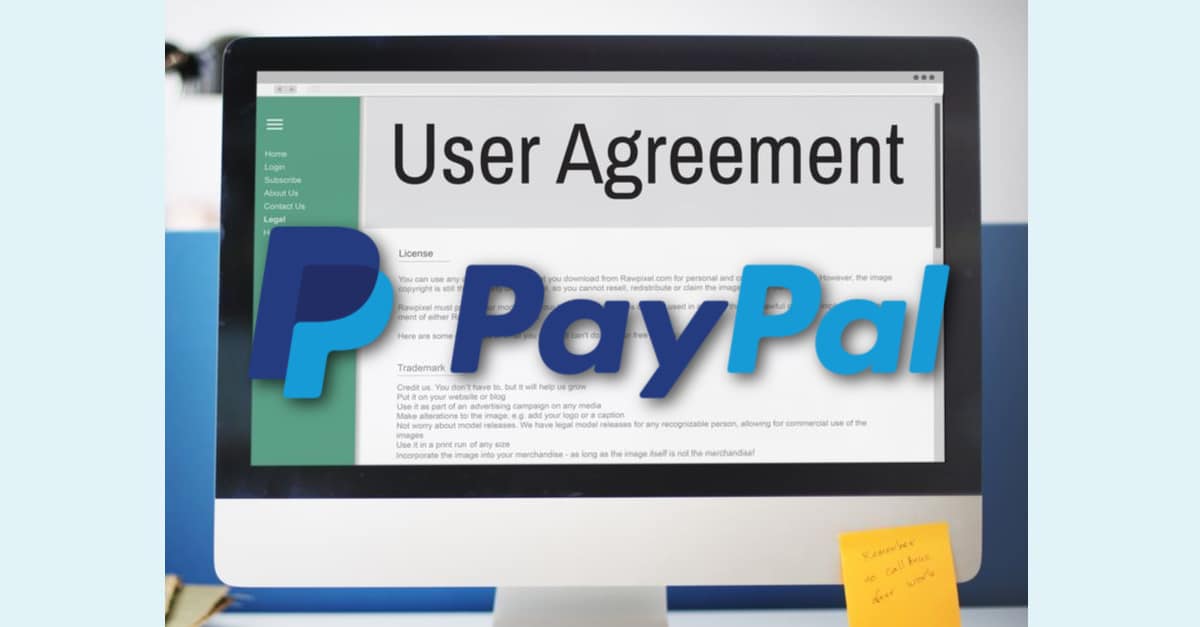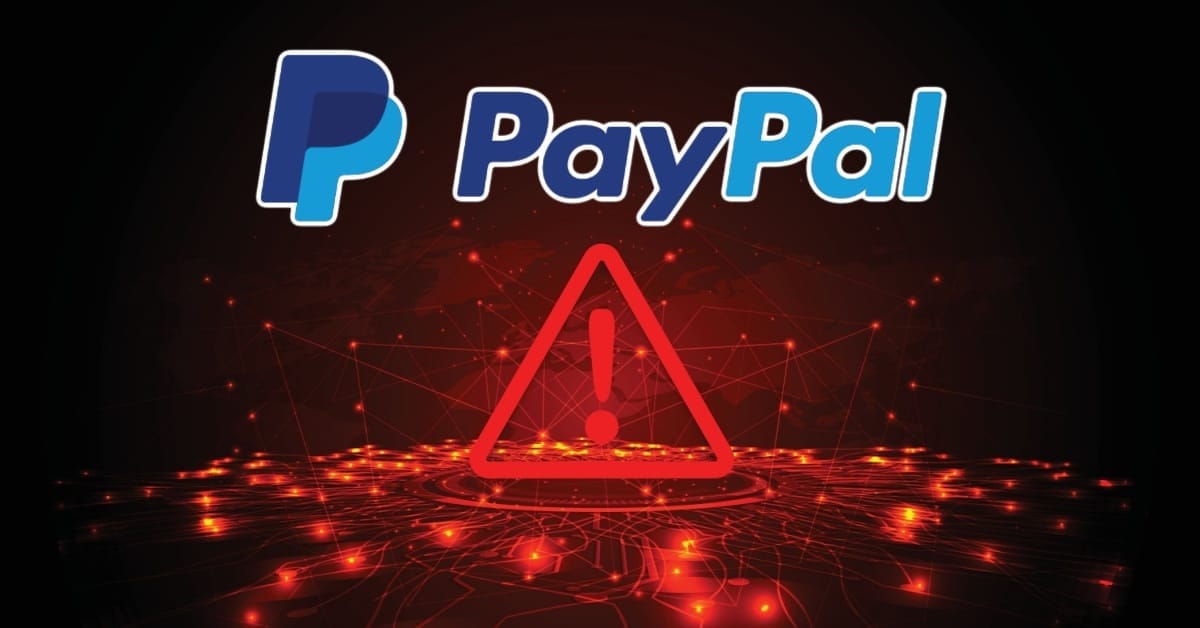PayPal Updates Acceptable Use Policy Raising Cancel Culture Concerns
UPDATE 11-11-22
PayPal has apparently now completely removed the part $2500 damages, effective October 29, 2022.
https://www.paypal.com/us/legalhub/acceptableuse-full
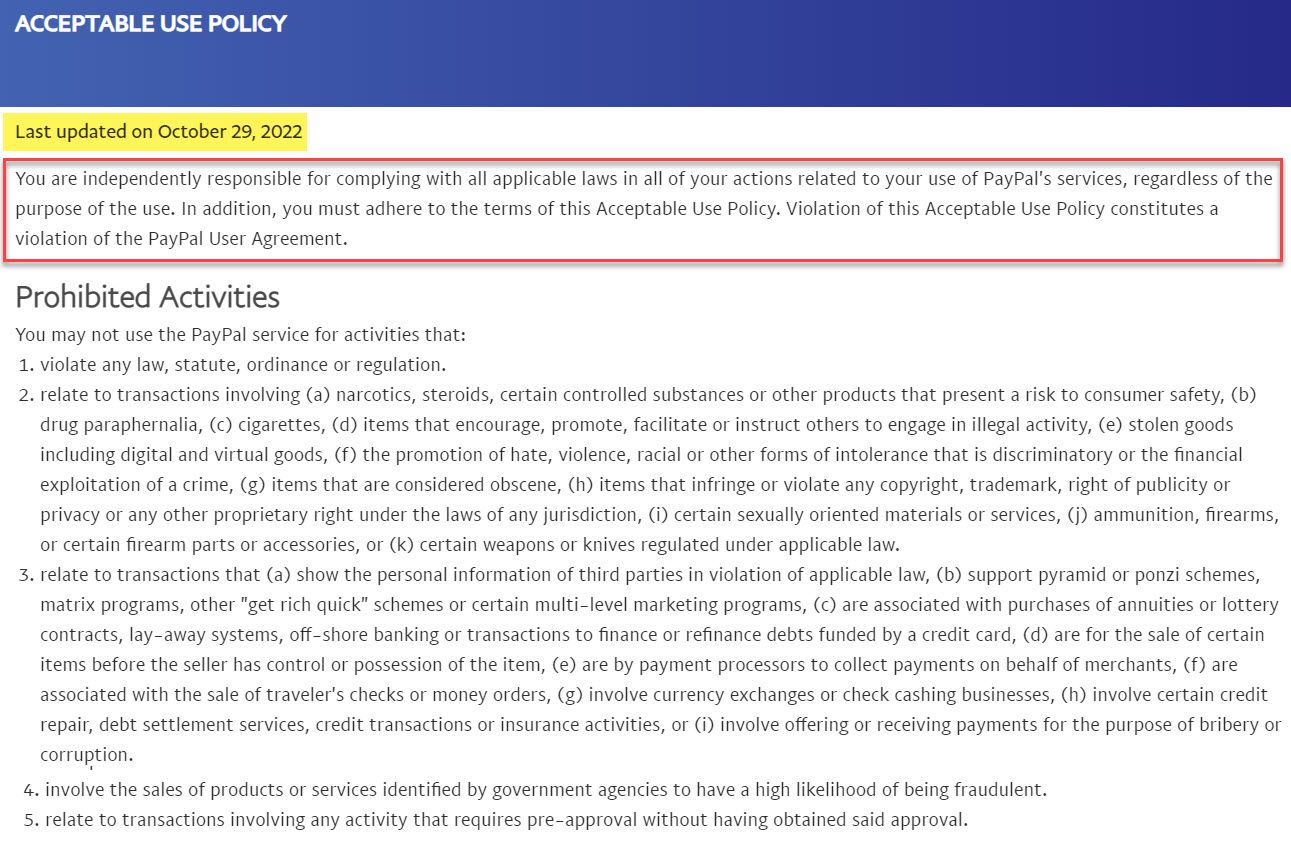
The previous policy said:
You are independently responsible for complying with all applicable laws in all of your actions related to your use of PayPal's services, regardless of the purpose of the use. In addition, you must adhere to the terms of this Acceptable Use Policy.
Violation of this Acceptable Use Policy constitutes a violation of the PayPal User Agreement and may subject you to damages, including liquidated damages of $2,500.00 U.S. dollars per violation, which may be debited directly from your PayPal account(s) as outlined in the User Agreement (see “Restricted Activities and Holds” section of the PayPal User Agreement).
The new version as of October 29, 2022 says:
You are independently responsible for complying with all applicable laws in all of your actions related to your use of PayPal's services, regardless of the purpose of the use. In addition, you must adhere to the terms of this Acceptable Use Policy. Violation of this Acceptable Use Policy constitutes a violation of the PayPal User Agreement.
So they've removed any mention of the $2500 from the Acceptable Use Policy, but now simply refer to the User Agreement - which does still mention $2500 in damages.
However, the User Agreement has also changed effective November 7, 2022.

Here's what the User Agreement said about the $2500 on October 27, 2022.
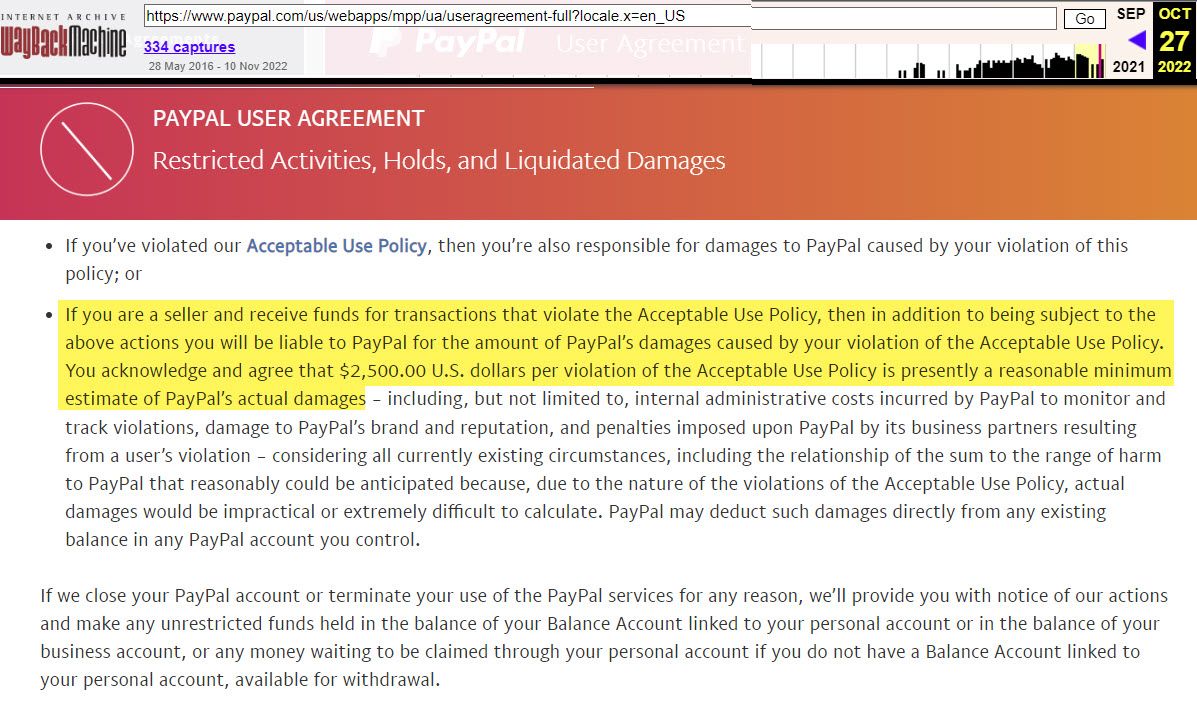
And here's what it says today, November 11, 2022:
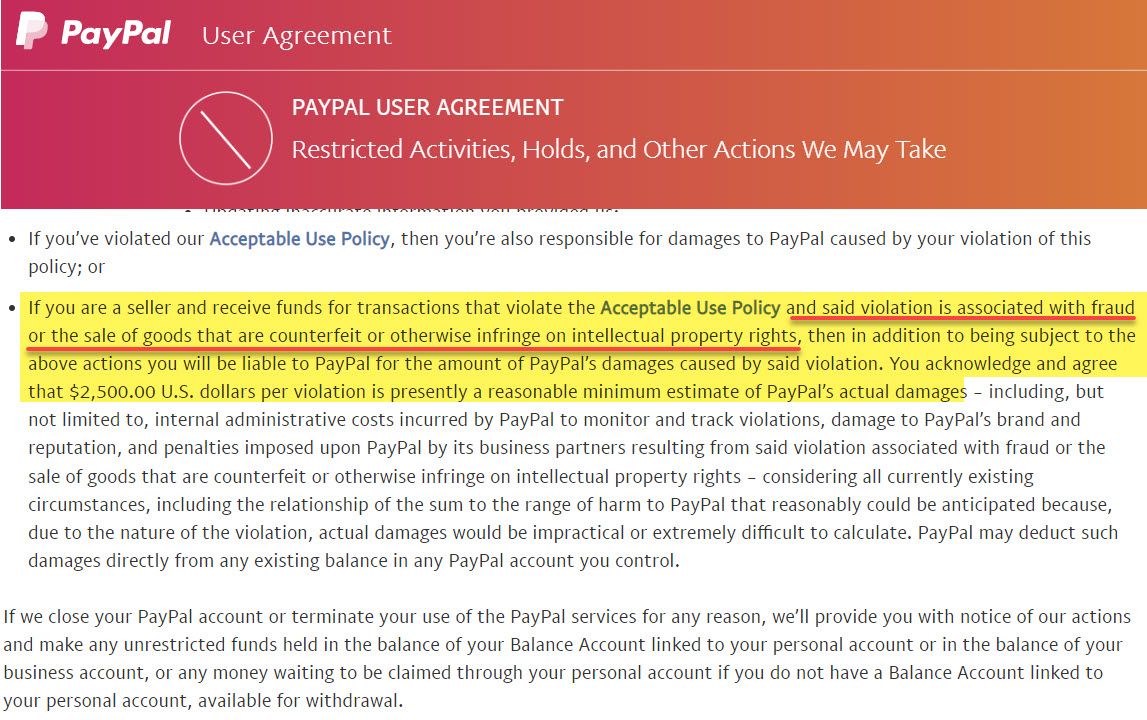
They've added language to specify the violation of the Acceptable Use Policy must be associated with fraud, counterfeit goods or IP infringement in order to be subject to the $2500 damages.
If you are a seller and receive funds for transactions that violate the Acceptable Use Policy and said violation is associated with fraud or the sale of goods that are counterfeit or otherwise infringe on intellectual property rights, then in addition to being subject to the above actions you will be liable to PayPal for the amount of PayPal’s damages caused by said violation.
UPDATE 10-27-22
I'm seeing a lot of social media activity saying PayPal added the fine for misinformation back in when no one was looking - which somewhat ironically is misinformation. 😉
The $2500 damages have been in the policy since September 2021. That can be confirmed by searching the Internet Archive.


The part about $2500 damages has been in place since at least that time, was never removed and has not been put back in when no one was looking.
The only part that was updated and then removed was point #5:

That part has not been added back in to the policy at this time.
UPDATE 10-21-22
House Republicans on Energy and Commerce, Financial Services and Oversight committees are requesting more details about PayPal's intentions in this matter and Consumer Financial Protection Bureau Director Rohit Chopra says he's keeping a close eye on the situation as well.
Will PayPal face legal or regulatory scrutiny over their Acceptable Use Policies even though they've since walked back the proposed update?
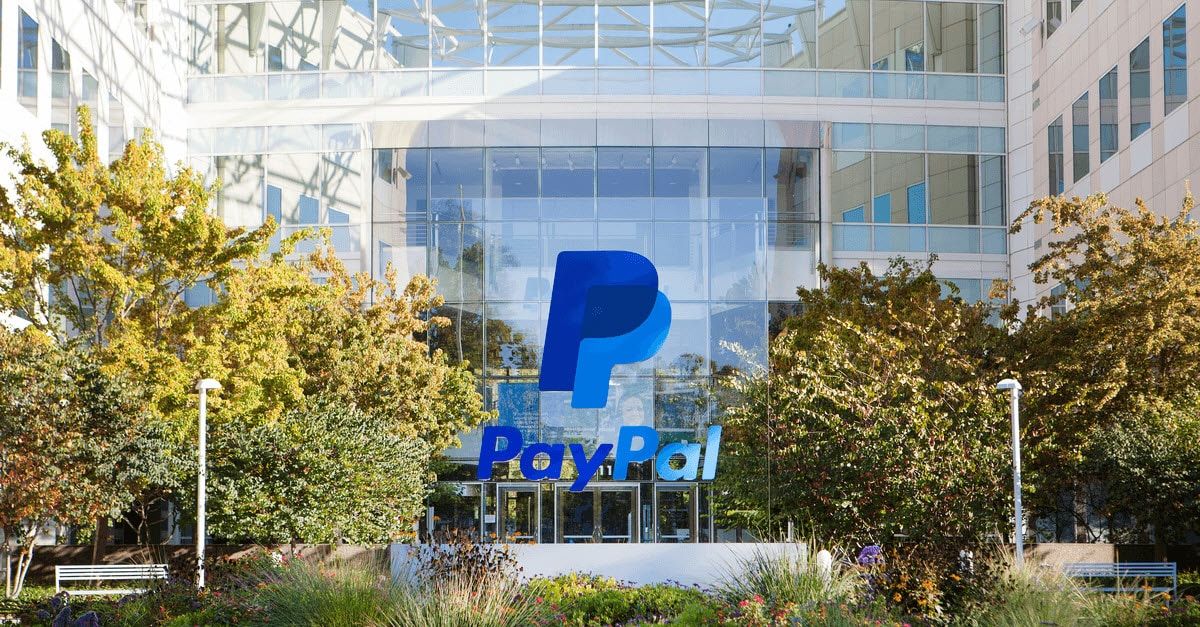
UPDATE 10-8-22
PayPal has officially backed down, though they fell short of actually posting a public retraction on the policy, instead opting to pretend like the whole thing never happened.
The policy updates page has removed the summary that said: "We are expanding the existing list of prohibited activities to include the sending, posting, or publication of messages, content, or materials that meet certain criteria."
And the link that previously went to a PDF of the new policy to be effective November 3 now just leads to a PDF that is one blank page.
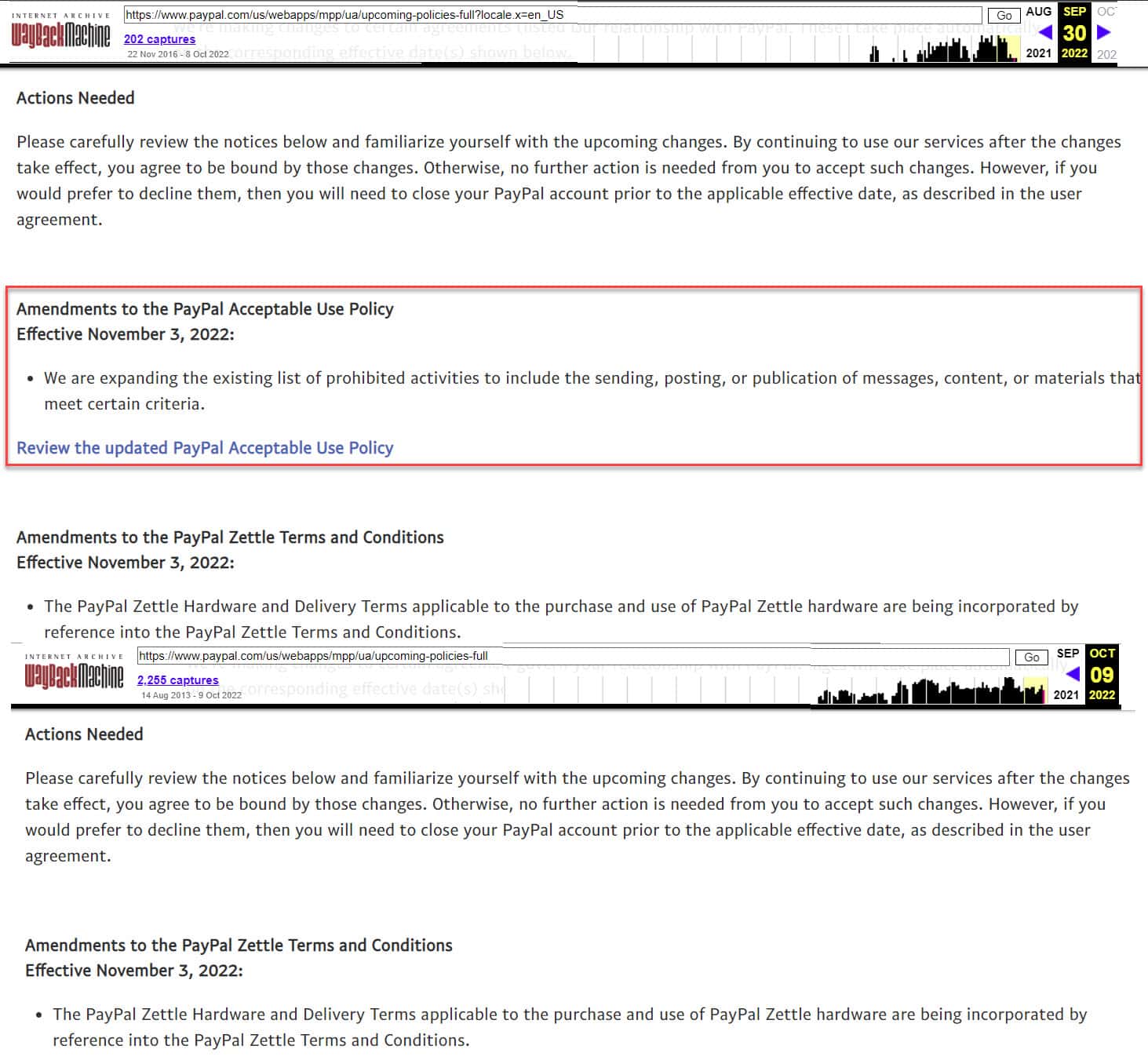
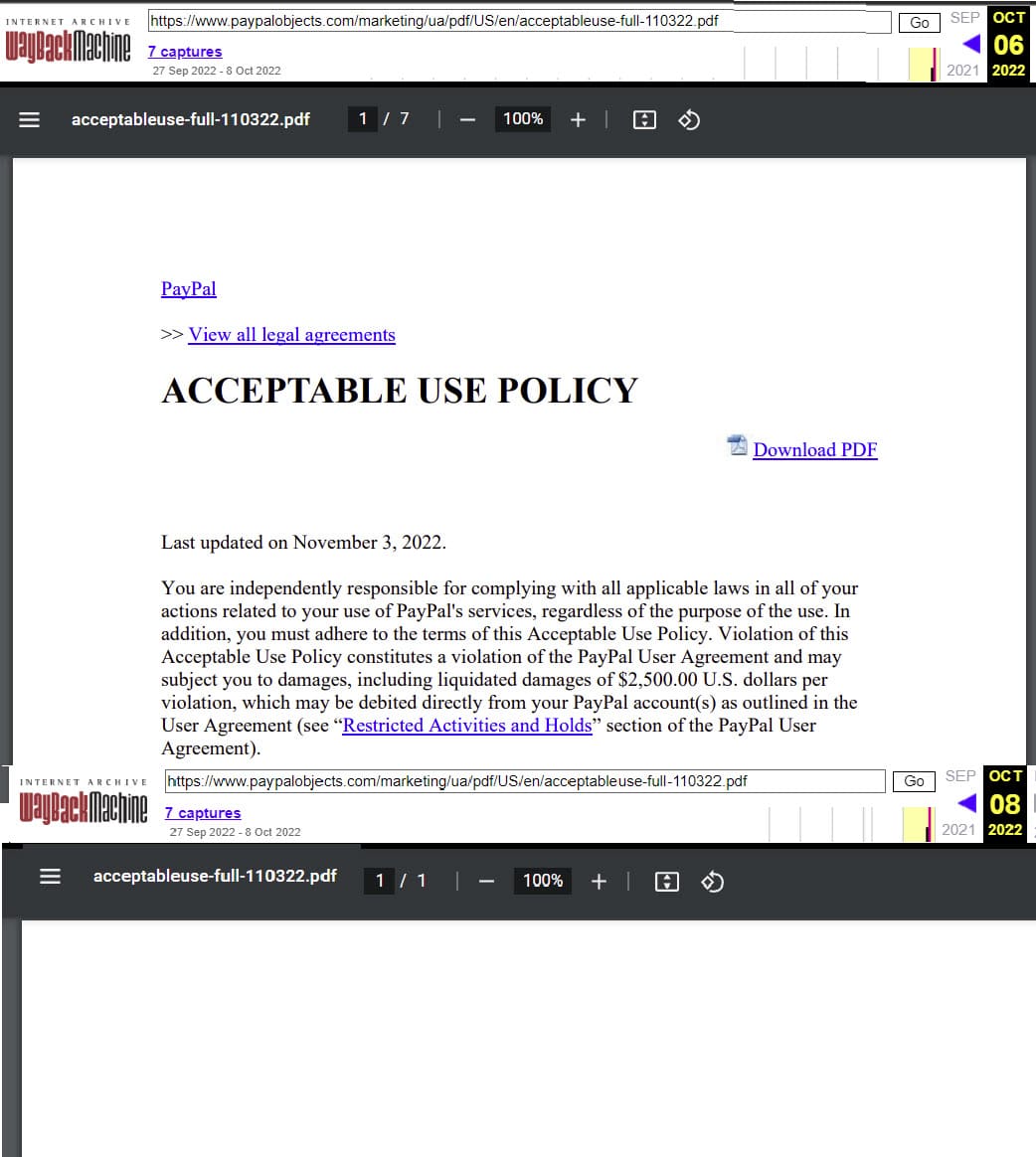
Original PDF file can be downloaded here:
UPDATE 10-8-22
There's been intense backlash over this new policy across the internet today with many users closing their accounts and some very high profile criticism, including Davis Marcus (previous PayPal president) and Elon Musk.
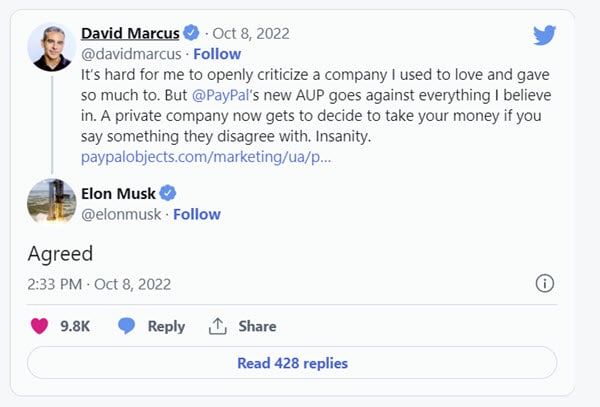
Lily Hay Newman, security writer at Wired, says PayPal is walking back the update, stating it was "never intended to be inserted in our policy."
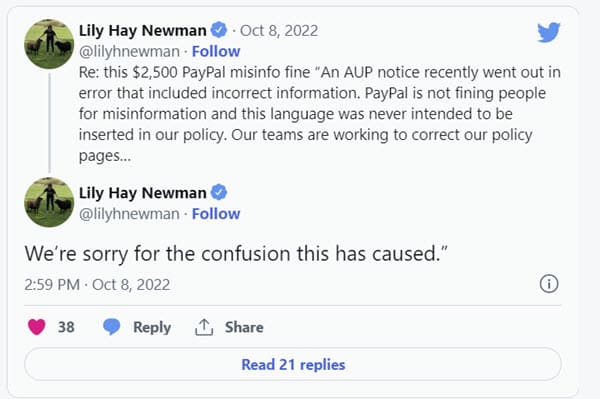
I have not seen anything directly from PayPal yet confirming this, but if so it's a pretty lame attempt to mitigate the disaster, in my opinion.
The language about $2,500 damages has been in the Acceptable Terms of Use Policy since at least September 2021. It's clear PayPal absolutely does intend for that to be part of their policy and has intended it for at least a year, if not longer.

If they meant they never intended for the language about misinformation and content that PayPal finds to be objectionable to be included - I can disprove that in one sentence:
It's the only thing that changed in this policy update.
It's not like there were other changes planned and "whoopsie" this part just slipped in and somehow skated through multiple reviews by legal. As shown in the screenshots below, the rest of the AUP stayed exactly the same - the only change made was to insert this section about "sending, posting, or publication of any messages, content, or materials" that PayPal finds objectionable.
If they didn't intend to insert that language, there would literally be no reason at all for an update of the policy to have been drafted, let alone presumably reviewed in multiple passes through legal, published online and emailed to accountholders.
If PayPal really is walking this one back, they would be far better served to simply be transparent and honest about their intentions and reasons for reversing course.
UPDATE 10-8-22
I've seen some discussion across social media with concerns that PayPal could disable your account under these provisions for any content you post anywhere on the internet, regardless of whether it's directly connected to your PayPal account or not.
For the record, I have not yet seen examples of that happening - so far it sounds like this is mostly affecting organizations or people who may publish content where they also use PayPal to process donations or membership payments, or businesses which sell merchandise and accept PayPal payments.
While the language is fairly broad, it's important to understand the first part before the full list of prohibited activities does appear to provide some limitation.
If you were to write it in regular sentence form it would say "You may not use the PayPal service for activities that...involve the sending, posting, or publication of any messages, content, or materials that, in PayPal’s sole discretion, are harmful, obscene, harassing, or objectionable..."
That should mean the publishing of content would have to be somehow connected to use of the PayPal service (a blog post on a site with a PayPal donation button, for example) rather than shutting down anyone's personal PayPal account because of some random tweet.
There is still plenty of cause for concern, in my opinion, and if I do hear that PayPal is taking things that far, I'll be sure to update. For now at least, I see no indication that it has or that this update would allow them to do so without legal repercussions.
PayPal has released an update to their Acceptable Use Policy in a clear reaction to recent high profile account cancellations that some have called "cancel culture."
PayPal summarized the changes as:
Upcoming Changes
We’re making changes to certain agreements (listed below) that govern your relationship with PayPal. These changes will take place automatically on the corresponding effective date(s) shown below...
Amendments to the PayPal Acceptable Use Policy
Effective November 3, 2022:We are expanding the existing list of prohibited activities to include the sending, posting, or publication of messages, content, or materials that meet certain criteria.
The full new Acceptable Use Policy can be found here (this link came directly from a verified email from PayPal to accountholders).
The new policy basically keeps the current list of prohibited activities and simply adds one more point:
- involve the sending, posting, or publication of any messages, content, or materials that, in PayPal’s sole discretion, (a) are harmful, obscene, harassing, or objectionable, (b) depict or appear to depict nudity, sexual or other intimate activities, (c) depict or promote illegal drug use, (d) depict or promote violence, criminal activity, cruelty, or self-harm (e) depict, promote, or incite hatred or discrimination of protected groups or of individuals or groups based on protected characteristics (e.g. race, religion, gender or gender identity, sexual orientation, etc.) (f) present a risk to user safety or wellbeing, (g) are fraudulent, promote misinformation, or are unlawful, (h) infringe the privacy, intellectual property rights, or other proprietary rights of any party, or (i) are otherwise unfit for publication.
For reference, here's what the current list of prohibited activities already states - keep in mind this has not changed, the new version retains this list and simply adds the above quoted language.
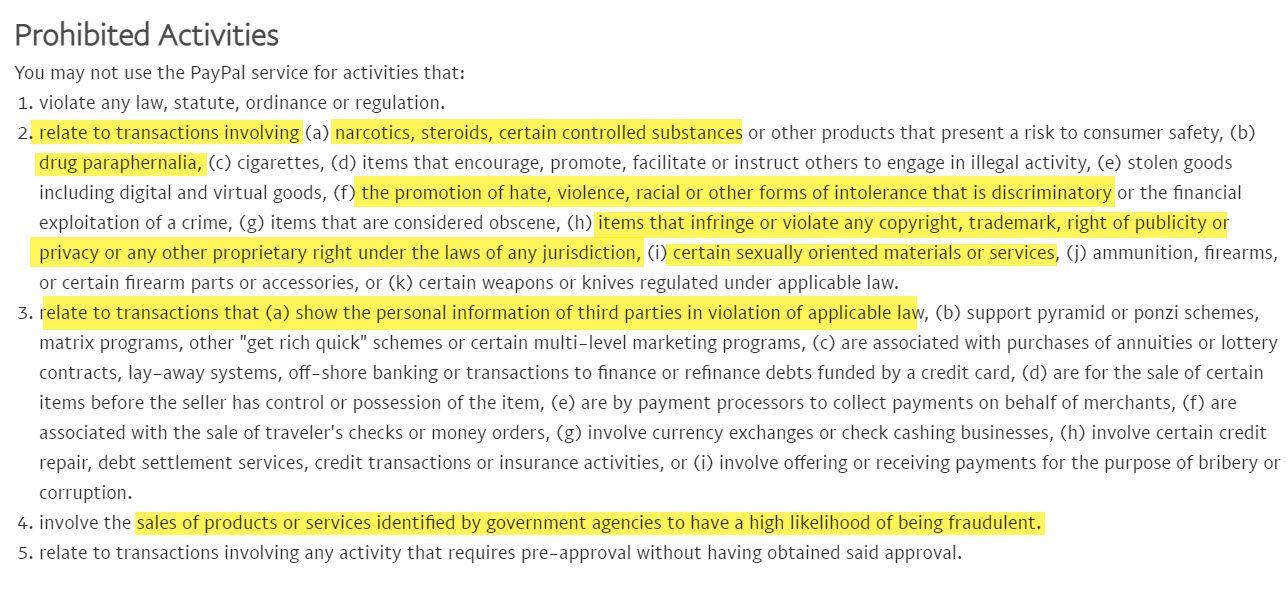
The prohibited activities list already covered, and still covers in these sections, issues such as the sale of or transactions involving sexually oriented material, illegal drugs, criminal activity, fraud, promotion of hate or violence, and infringement of intellectual property and privacy rights - so why add another section basically saying the same thing, but expanding it to the sending, posting or publication of content PayPal deems "harmful"?
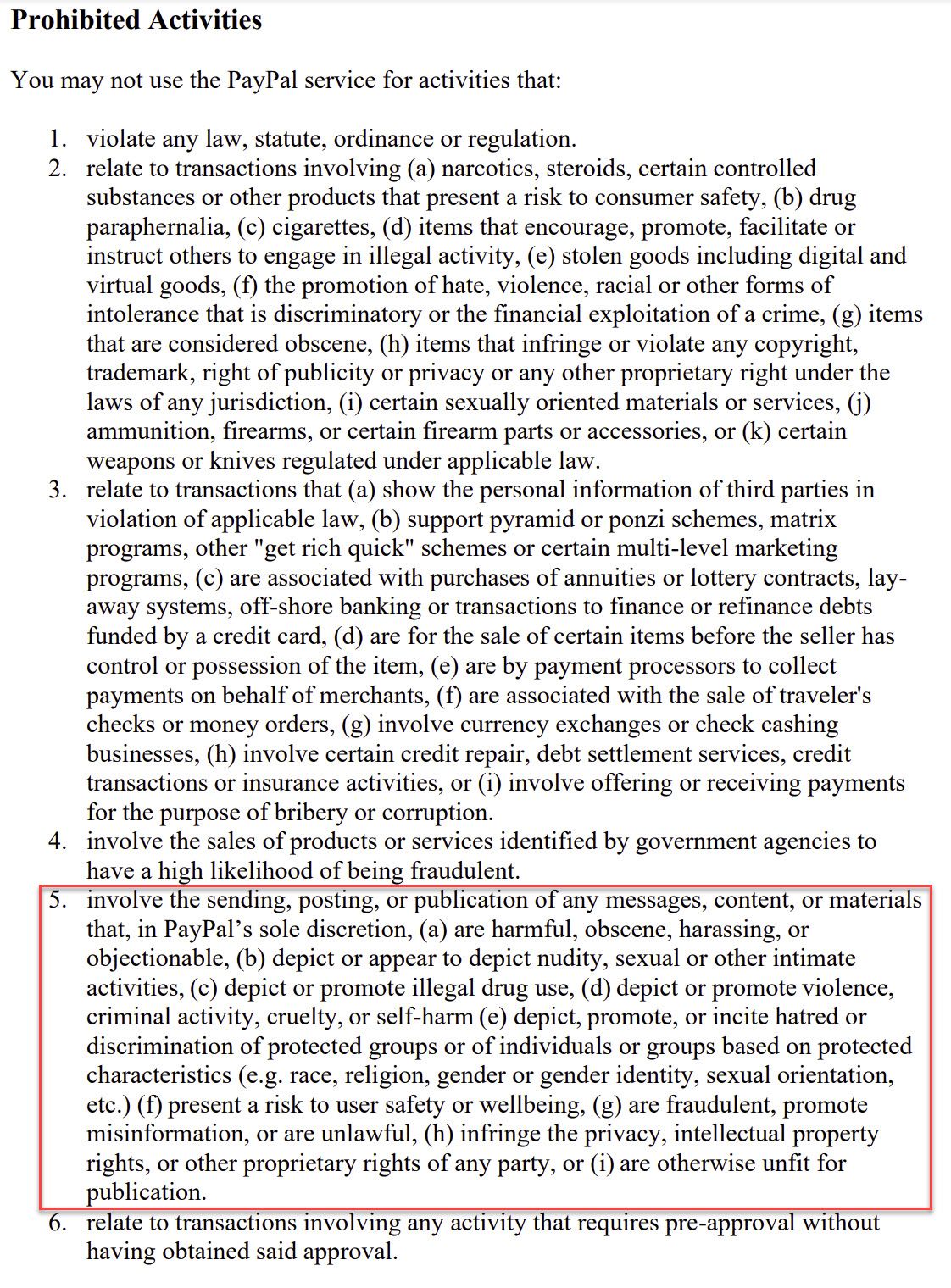
The answer can likely be found in recent headlines regarding the sudden account closures of some people and organizations that have been deemed controversial and accused of violating PayPal's policies.
Just a few examples:

PayPal has shut down the account of the Free Speech Union, an organisation which defends gender-critical academics and people who have lost work for expressing opinions.
The US payments company shut down the accounts of the Free Speech Union, its founder Toby Young, and his opinion and news website the Daily Sceptic with no clear explanation last week, The Telegraph can reveal.
Mr Young said he suspected the action was driven by political motives and was a “sinister form of cancel culture”...
...A spokesman for PayPal said it could not comment on individual customers, but said that PayPal “regularly assesses activity against our long-standing Acceptable Use Policy and will discontinue our relationship with account holders who are found to violate our policies”...
...PayPal also reportedly suspended the accounts of two anti-war US media organisations, Consortium News and Mint Press, without a clear explanation.

A parents’ group that fought to keep schools open during the pandemic has become the latest to have their account shut down by PayPal due to “the nature of its activities”.
UsForThem said it has been unable to access thousands of pounds in donations from its account after PayPal announced it was discounting service to one of the group’s directors “in accordance with” the technology company’s user agreement...
...Other groups which have said their accounts have recently been shut down by PayPal include Left Lockdown Sceptics, which describes itself as a “socialist collective” opposed to government lockdown measures.
Molly Kingsley, co-founder of UsForThem, said: “We were completely taken aback to learn that PayPal was discontinuing our services ‘due to the nature of [our] activities’. No prior warning or meaningful explanation was given, and despite them saying we could withdraw our remaining balance, we cannot...
...A spokesman for PayPal said the company was not able to comment on individual accounts but he said the company was not discriminatory and “does not take decisions lightly” on shutting down accounts, pointing out that the company has more than 400 million customers with a range of viewpoints. He said the company’s acceptable use policy covers “a broad range of actions”, including “spreading misinformation about the Covid vaccine” and “hate speech”.
Iain Mansfield, director of research at Policy Exchange, said: “This is a company taking deliberate action to silence and suppress lawful political groups with whom they disagree.
“The Government should amend the Online Safety Bill to protect individuals’ and organisations’ access to basic digital infrastructure, rather than giving companies more power to act as censors.”
It's also worth noting both the current version (in effect since September 20, 2021) and the updated version (effective November 3, 2022) of the AUP say (emphasis mine):
Violation of this Acceptable Use Policy constitutes a violation of the PayPal User Agreement and may subject you to damages, including liquidated damages of $2,500.00 U.S. dollars per violation, which may be debited directly from your PayPal account(s) as outlined in the User Agreement (see “Restricted Activities and Holds” section of the PayPal User Agreement).
That's right - if you're found to be in violation of any part of the policy, PayPal may directly debit $2,500 per violation from your account for damages. While that part of the policy is not new, and it's not clear how often PayPal actual does collect those damages, it's concerning to see that it may now be applied even more broadly and subjectively than before.
Anyone else see a possible conflict of interest here? 🤨
So back to the question - why would PayPal add an additional section to their acceptable use policy that seems to reiterate a lot of what was already there, just in more explicit and direct terms and expanding to cover the mere act of sending or posting content PayPal considers "harmful"?
I'd say the legal department is likely in full CYA mode in advance of possible legal challenges and legislative or regulatory changes that may occur, whether it's changes to the Online Safety Bill in the UK or fallout that may come from the recently announced US Supreme Court decision to take on a case challenging Section 230.
Whether you agree with or approve of organizations like the Free Speech Union or UsForThem or not, there are some very real and serious questions raised here about just who gets to define what is considered hate speech or misinformation and what should happen when an account is deemed to be in violation of policies.
The previous version of the policy focuses on specific activities and transactions, whereas the new policy explicitly adds in speech - the creation and distribution of content PayPal, in their sole discretion, finds objectionable.
That's a major line to cross and one that should give us pause, regardless of where we land on the political spectrum.
Should PayPal be allowed to block users' access to its services based solely on arbitrary determinations about content being harmful? Should there have to be a clear violation of law before action can be taken to cut off a financial account?
Should PayPal be allowed to financially benefit from these decisions by withholding damages and freezing funds when they shut down accounts for policy violations?
Let us know what you think in the comments below!
It does appear PayPal updated the page again after the last update to this article, which was October 27, 2022.
Here's a link to what the page looked like on that date as saved in the Internet Archive:
https://web.archive.org/web/20221027165730/https://www.paypal.com/us/legalhub/acceptableuse-full
Currently PayPal is showing the page was updated on October 29, 2022 and it appears they completely removed any reference to the $2500 damages from that page.
It is still in the User Agreement, but they've also updated that page to make it clear it only applies in very specific situations.
Thanks for the heads up, I'll post another update above!
This is obviously on PP’s agenda. So I’ll work to remove them as a provider. Stinks!
I get it's trying to weed out the 'snake oil' salesmen, but it's just too broad of language IMO.
The Humpty Dumpty approach is just not good enough when people's lives and livelihoods are on the line.






